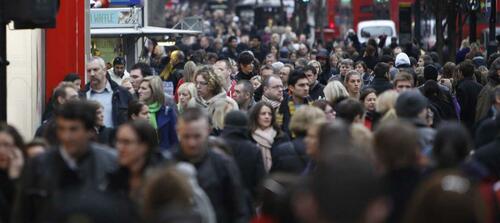
Authored by Thomas Brooke via ReMix News,
The U.K.'s cumulative net migration in the 25 years up to 1997 was just 68,000. In the 25 years to follow, cumulative net migration was at least 5.8 million," a damning new report co-authored by Britain's former immigration minister Robert Jenrick finds, exposing the myths perpetuated by the Western liberal mainstream
Mass immigration has not delivered the economic growth successive U.K. governments claimed it would and has contributed to rising pressure on public services, Britain’s former immigration minister, Robert Jenrick, has claimed in a report written in collaboration with a leading think tank.
The report by the Center for Policy Studies published this week offers several findings that challenge the Western liberal narrative that mass immigration fuels economic growth, provides a fiscal benefit, and is a force for good for European nations.
“The scale and composition of recent migration have failed to deliver the significant economic and fiscal benefits its advocates promised, while putting enormous pressure on housing, public services, and infrastructure,” it states.
The study found that net migration accounted for 89 percent of the 1.34 million increase in England’s housing deficit over the last decade, resulting in a housing shortage and pushing house prices to a record property-price-to-salary ratio.
It warned that Britain would have to build a home every five minutes night and day just to cope with the current levels of immigration. The 515,000 homes needed every year would be the equivalent of adding a city the size of Cardiff to the U.K. every year.
In an accompanying video, the co-authors explained that cumulative net migration in the 25 years leading up to former Labour Prime Minister Tony Blair’s 1997 election victory had been just 68,000. In the 25 years to follow, cumulative net migration was at least 5.8 million.
I resigned from government because I refused to be another politician who broke their promise to reduce immigration.
— Robert Jenrick (@RobertJenrick) May 8, 2024
Three decades of mass migration have utterly failed the British public.
The costs have been covered up.
Here is the truth that needs to be told👇 pic.twitter.com/iMMWO2Yi14
“A total of 1.2 million people arrived in the U.K. last year. That means 1 in 60 people living in the U.K. today only arrived in the last 12 months,” the video states.
Non-EU migration to Britain has sky-rocketed following Brexit, but the overwhelming majority of new arrivals are not heading to the U.K. to work, and therefore pay taxes and boost the economy. Just 15 percent of those arriving from outside the European Union in the last 5 years came on a work visa.
The hard-hitting video also revealed that Britain’s population increased by 8 million people between 2001 and 2021, of which 7 million were due to mass immigration.
“That’s the equivalent of the combined populations of Birmingham, Manchester, Belfast, Cardiff, Edinburgh, Glasgow, Leeds, Leicester, Liverpool, Newcastle, Peterborough, Ipswich, Norwich, Luton, and Bradford,” it states.
The report found that mass immigration had “not delivered significant growth in GDP per capita,” and had increased pressures on critical infrastructure “from roads to GP surgeries.”
It also provided details on the difference in the quality of immigration around the world, highlighting that migrants from the Middle East, North Africa, and Turkey are “almost twice as likely to be economically inactive as someone born in the U.K.”
Similarly, migrants from Somalia and Pakistan typically pay between four and nine times less in income tax than those from Canada, Singapore, and Australia.
The report offered 30 recommended measures the government should implement to “take back control” of mass immigration, including stricter rules on the rights of overseas students to remain in Britain once they’ve finished their initial studies.
It also called for splitting up the Home Office, the U.K.’s interior ministry, and establishing a separate Department of Border Security and Immigration Control dedicated to the issue.
Other recommendations included the setting of an annual cap on visas in specific industries, namely health and social care, which typically offer lower wages and entice migrants to take these jobs in order to come to Britain; reaffirming a national commitment to return net migration to the historical norm of the tens of thousands; and scrapping the Shortage Occupation List, which exempts certain overseas applicants from meeting stricter criteria for visas.
Commenting on the report, Jenrick explained how he had resigned as an immigration minister in December last year because he “refused to be another politician who broke their promise to reduce immigration.”
At the time of his resignation, Jenrick cited the government’s Rwanda policy as the primary reason for his departure, insisting the legislation did not go far enough and would not be able to effectively reduce illegal immigration into Britain.
“Three decades of mass migration have utterly failed the British public. The costs have been covered up. Here is the truth that needs to be told,” Jenrick added.
Authored by Thomas Brooke via ReMix News,
The U.K.’s cumulative net migration in the 25 years up to 1997 was just 68,000. In the 25 years to follow, cumulative net migration was at least 5.8 million,” a damning new report co-authored by Britain’s former immigration minister Robert Jenrick finds, exposing the myths perpetuated by the Western liberal mainstream
Mass immigration has not delivered the economic growth successive U.K. governments claimed it would and has contributed to rising pressure on public services, Britain’s former immigration minister, Robert Jenrick, has claimed in a report written in collaboration with a leading think tank.
The report by the Center for Policy Studies published this week offers several findings that challenge the Western liberal narrative that mass immigration fuels economic growth, provides a fiscal benefit, and is a force for good for European nations.
“The scale and composition of recent migration have failed to deliver the significant economic and fiscal benefits its advocates promised, while putting enormous pressure on housing, public services, and infrastructure,” it states.
The study found that net migration accounted for 89 percent of the 1.34 million increase in England’s housing deficit over the last decade, resulting in a housing shortage and pushing house prices to a record property-price-to-salary ratio.
It warned that Britain would have to build a home every five minutes night and day just to cope with the current levels of immigration. The 515,000 homes needed every year would be the equivalent of adding a city the size of Cardiff to the U.K. every year.
In an accompanying video, the co-authors explained that cumulative net migration in the 25 years leading up to former Labour Prime Minister Tony Blair’s 1997 election victory had been just 68,000. In the 25 years to follow, cumulative net migration was at least 5.8 million.
I resigned from government because I refused to be another politician who broke their promise to reduce immigration.
Three decades of mass migration have utterly failed the British public.
The costs have been covered up.
Here is the truth that needs to be told👇 pic.twitter.com/iMMWO2Yi14
— Robert Jenrick (@RobertJenrick) May 8, 2024
“A total of 1.2 million people arrived in the U.K. last year. That means 1 in 60 people living in the U.K. today only arrived in the last 12 months,” the video states.
Non-EU migration to Britain has sky-rocketed following Brexit, but the overwhelming majority of new arrivals are not heading to the U.K. to work, and therefore pay taxes and boost the economy. Just 15 percent of those arriving from outside the European Union in the last 5 years came on a work visa.
The hard-hitting video also revealed that Britain’s population increased by 8 million people between 2001 and 2021, of which 7 million were due to mass immigration.
“That’s the equivalent of the combined populations of Birmingham, Manchester, Belfast, Cardiff, Edinburgh, Glasgow, Leeds, Leicester, Liverpool, Newcastle, Peterborough, Ipswich, Norwich, Luton, and Bradford,” it states.
The report found that mass immigration had “not delivered significant growth in GDP per capita,” and had increased pressures on critical infrastructure “from roads to GP surgeries.”
It also provided details on the difference in the quality of immigration around the world, highlighting that migrants from the Middle East, North Africa, and Turkey are “almost twice as likely to be economically inactive as someone born in the U.K.”
Similarly, migrants from Somalia and Pakistan typically pay between four and nine times less in income tax than those from Canada, Singapore, and Australia.
The report offered 30 recommended measures the government should implement to “take back control” of mass immigration, including stricter rules on the rights of overseas students to remain in Britain once they’ve finished their initial studies.
It also called for splitting up the Home Office, the U.K.’s interior ministry, and establishing a separate Department of Border Security and Immigration Control dedicated to the issue.
Other recommendations included the setting of an annual cap on visas in specific industries, namely health and social care, which typically offer lower wages and entice migrants to take these jobs in order to come to Britain; reaffirming a national commitment to return net migration to the historical norm of the tens of thousands; and scrapping the Shortage Occupation List, which exempts certain overseas applicants from meeting stricter criteria for visas.
Commenting on the report, Jenrick explained how he had resigned as an immigration minister in December last year because he “refused to be another politician who broke their promise to reduce immigration.”
At the time of his resignation, Jenrick cited the government’s Rwanda policy as the primary reason for his departure, insisting the legislation did not go far enough and would not be able to effectively reduce illegal immigration into Britain.
“Three decades of mass migration have utterly failed the British public. The costs have been covered up. Here is the truth that needs to be told,” Jenrick added.
Loading…






